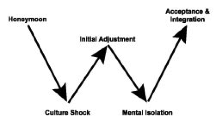Has your student crashed? Was he unbelievably excited at first and now he’s not sure he wants to be here? Relax. It’s all part of the natural progression most students experience when they go to college. It’s called the W-Curve, and it’s made up of five stages: Honeymoon, Culture Shock, Initial Adjustments, Mental Isolation, and Acceptance & Integration.
Last issue we discussed the first three stages of the W-Curve:
 The Honeymoon: Everything is great. College is so exciting!
The Honeymoon: Everything is great. College is so exciting!- Culture Shock: Reality sets in. Things here are different, not quite what they expected. They miss home. They’re a little tired.
- Initial Adjustments: They look the new reality in the face. They make some necessary changes—in their expectations, their habits—and regain their confidence. Life is pretty good again.
Now we’ll look more deeply at the last two stages, mental isolation and acceptance/integration. Your student may not experience these stages until after Christmas break. Or if they’ve already spent considerable amounts of time away from home—such as living at a prep school—they may not experience them at all.
Mental Isolation: After being home for a longer break—midterm break, Thanksgiving, or Christmas, maybe—they feel caught between two worlds and belonging to neither one. The dynamic at home may have changed while they were gone. A younger brother or sister has much of the family’s attention, a pet has died, they have less to talk about with their old friends, their high school romance has tanked—and now they feel homesick for home, the home they knew, the home that isn’t there anymore.
And yet college doesn’t feel like home yet either. They may not have found a posse they’re completely comfortable with. They may be disappointed in how a class, an athletic season, a concert, or even Homecoming turned out. They may be surprised that students at a Christian college sin. They may suddenly wonder whether their lifelong dream of being a teacher or pastor is still their dream. They feel isolated and alone.
This stage is really a second culture shock, maybe more difficult to weather than the first one. What students need to do at this stage is make a conscious decision to make this college thing work. With prayer and trust in God, they need to combine the best of the college culture with the best of the culture they grew up with. They need to discard old things they’ve outgrown and also new things they don’t want to own. They need to take a deep breath and embrace this new life, taking a courageous leap into that holy adventure called the future.
Acceptance and Integration: As they make these adjustments and spend more time at college—sometimes all it takes is time!—things get better. They develop more history with their friends here. They find a club or activity that really fits. They find a professor or staff member who kindly mentors them. In short, they feel connected. In fact, sometime next spring, as they’re packing up for their return trip to school, you may hear them say, “Well, I guess I’ve got to get back home.” Home! Try to see that not as an arrow to the heart, but as a sign that they’re adjusting, they’re finding a niche, they’re happy—in short, they’re doing exactly what you hope and pray that they’ll do.



